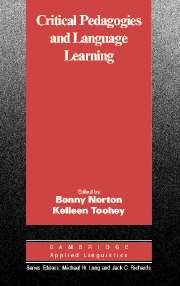Book contents
Chapter 1 - Critical pedagogies and language learning: An introduction
Published online by Cambridge University Press: 05 October 2012
Summary
Advocates of critical approaches to second language teaching are interested in relationships between language learning and social change. From this perspective, language is not simply a means of expression or communication; rather, it is a practice that constructs, and is constructed by, the ways language learners understand themselves, their social surroundings, their histories, and their possibilities for the future. This collection assembles the work of a variety of scholars interested in critical perspectives on language education in globally diverse sites of practice. All are interested in investigating the ways that social relationships are lived out in language and how issues of power, while often obscured in language research and educational practice (Kubota, this volume), are centrally important in developing critical language education pedagogies. Indeed, as Morgan (this volume) suggests, “politically engaged critiques of power in everyday life, communities, and institutions” are precisely what are needed to develop critical pedagogies in language education. The chapters have varying foci, seeking to better understand the relationships between writers and readers, teachers and students, test makers and test takers, teacher-educators and student teachers, and researchers and researched.
The term critical pedagogy is often associated with the work of scholars such as Freire (1968/1970), Giroux (1992), Luke (1988), Luke and Gore (1992), McLaren (1989), and Simon (1992) in the field of education. Aware of myriad political and economic inequities in contemporary societies, advocates have explored the “social visions” that pedagogical practices support (Simon, 1992), and critiques of classroom practices in terms of their social visions have been common and longstanding in critical educational literature.
- Type
- Chapter
- Information
- Critical Pedagogies and Language Learning , pp. 1 - 18Publisher: Cambridge University PressPrint publication year: 2004
- 28
- Cited by



